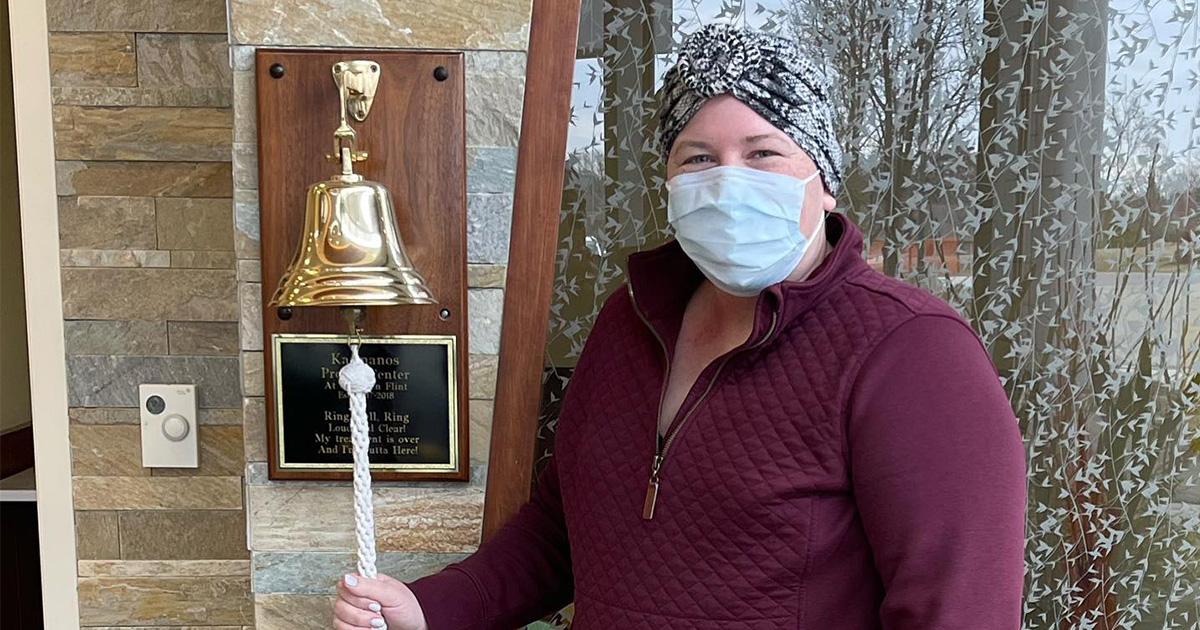
There are very few symptoms of breast cancer, making it one of the most well-known silent cancers. However, there are some preventative measures you can take with breast cancer that aren’t available with other silent cancers including screening with mammograms and genetic testing.
The number one symptom of breast cancer is a new lump or mass, according to the American Cancer Society.
“My dad tested positive for a BRCA2 gene mutation in 2011. Many of my aunts and cousins in my family have or have had breast cancer, and I have lost aunts to the disease,” said Mollie Bort, breast cancer patient at Karmanos Cancer Institute at McLaren Greater Lansing. “It has always felt like a question of when, not if, so when I found a lump in my right breast in the spring of 2022, it wasn’t surprising, even though I was only 33 years old.”
Part of the reason it wasn’t surprising for Bort is because she had found lumps previously and had them checked out before.
“Because of my family history, I had gotten really good at self-breast exams,” said Bort. “I had even gone a couple of times to my OB-GYN to have an ultrasound performed on lumps and bumps to ease my mind. It’s so important to find a primary care doctor or OB-GYN that you can trust and takes you seriously.”
The lump Bort found in the spring of 2022 was biopsied and came back positive for ductal carcinoma in situ (DCIS), which is abnormal cells inside the milk ducts. Given her family history and the biopsy results, she was then scheduled for surgery to remove both breasts as a preventative measure.
“When I was in surgery for my bilateral mastectomy, they removed and tested the first lymph node, and it also tested positive for cancerous cells,” said Bort. “At that time, my surgical team decided to just take my right breast and then talk about what future steps would be.”
Bort met with Jatin Rana, MD, a medical oncologist with MSU Health Care who works at Karmanos Cancer Institute at McLaren Greater Lansing.
“Ask questions. There are no dumb questions when it comes to getting care for cancer. If you are worried about something that is in your treatment plan, if you have a question about a side effect, ask your team. They are here for you,” said Bort.
Dr. Rana and a team of doctors and support staff created a personalized treatment plan specifically for Bort that included chemotherapy and proton therapy. Proton therapy is a radiation oncology treatment that uses protons to precisely target and treat tumors while sparing healthy tissues and organs from unnecessary radiation.
“My care team approached me with the idea of proton therapy,” said Bort. “I had already done everything to get radiation therapy here in Lansing when my radiation oncologist called me. He explained he could still do radiation therapy at the location in Lansing, but because of where my cancer was, the radiation would hit my lung. He said if I was willing to make the daily drive to Flint, he would prefer to send me for proton therapy.”
There are only two locations in the state of Michigan currently offering proton therapy. One of those is the McLaren Proton Therapy Center in Flint. This specialized radiation therapy doesn’t completely go through your body like regular radiation therapy, which is a great option for breast care patients since the lungs and heart are in such proximity to the breasts and can often be impacted during regular radiation therapy for breast cancer patients.
“In February of this year, I started proton therapy and drove to Flint every day for that treatment for six weeks,” said Bort. “It went very smoothly, and I loved my care team in Flint also.”
Bort has completed her breast cancer treatment plan and is currently NED, or with no evidence of disease, waiting for breast reconstruction.
“Being diagnosed with cancer was a good reminder of how many people I have around me who care about me,” said Bort. “I have three young kids, and so many family members and friends stepped up when I was going through treatments to help with childcare, meals, or just to listen.”
Going through cancer treatment takes a village, and it’s important to find that through friends and family, or even strangers going on the same journey. McLaren Greater Lansing offers support groups and classes specifically for oncology patients and survivors. For a full list, click here.
“Even though I had amazing support all around me, I also saw a therapist,” said Bort. “I knew that the people closest to me were also struggling with their own grief, and I didn’t want to add to that. It was nice to be able to trauma dump on someone who is trained that help me navigate through everything I felt and experienced during this journey.”
October is Breast Cancer Awareness Month and a good time to remind women to schedule their mammograms. Early detection is the best prevention. To learn more or to schedule an appointment, click here.
For more information about Karmanos Cancer Institute at McLaren Greater Lansing, click here.
For more information about proton therapy at McLaren Flint, click here.
For more articles on health and wellness, click here.